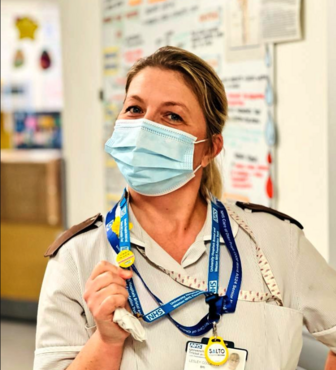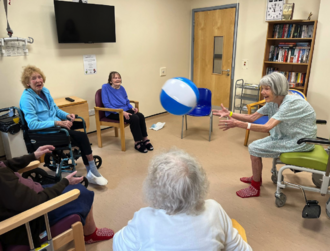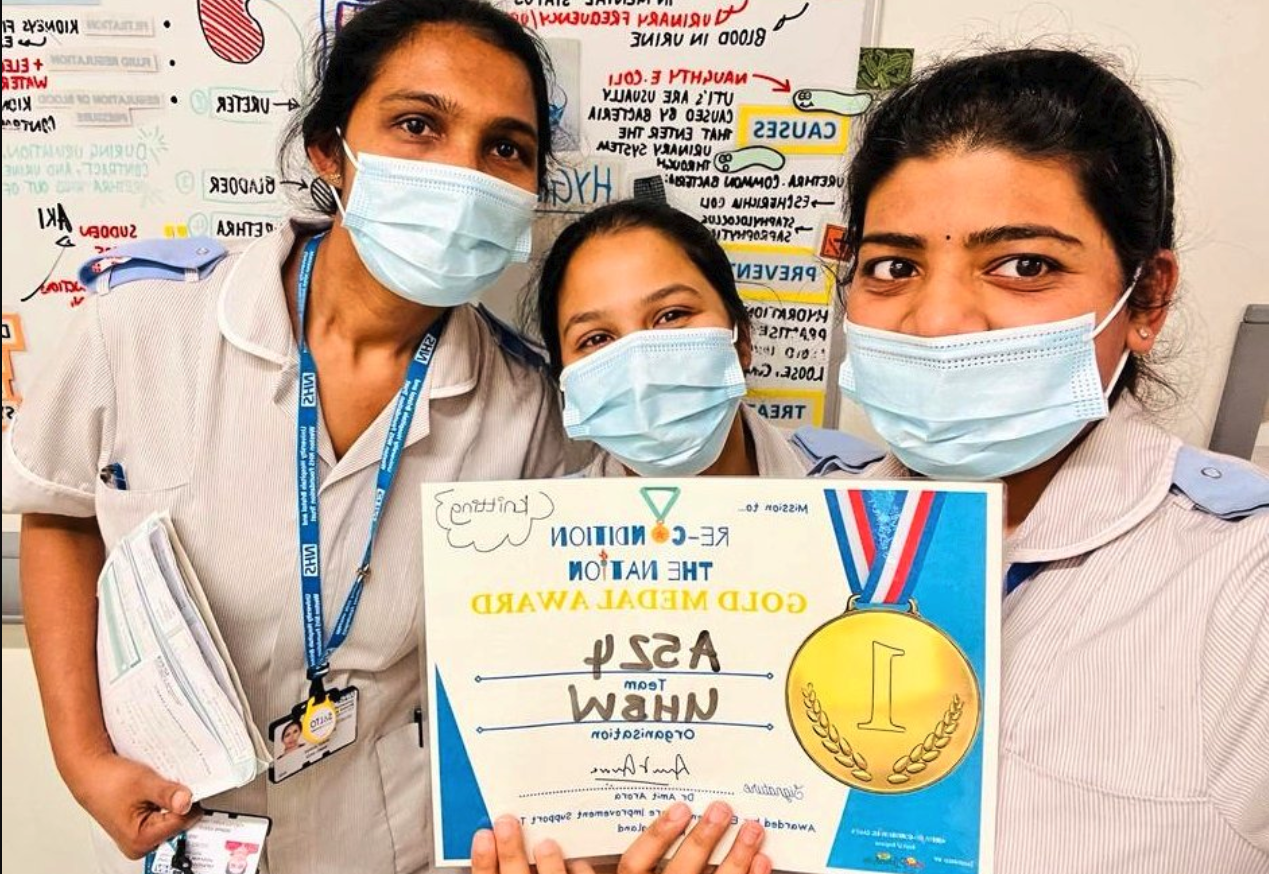The Reconditioning Games campaign has taken the ethos and learning from the East of England Winter (De)-Conditioning Games last year, elevating the attention on the spread of deconditioning to national level and evolving patient and carer engagement, across-all sectors of the health and care system.
The campaign engages health and care teams nationally, raising awareness of deconditioning, encouraging small-scale tests of change, and sharing innovations, whilst supporting the implementation of local and national initiatives.
The ambition was to achieve a sustainable reduction and reversal of functional and cognitive decline in the population nationally whilst improving the wellbeing of staff.

Since the launch of the campaign in November 2022, 98 organisations (so far) have taken part, representing 31 ICB systems, and all regions across England represented as well as parts of Wales and Scotland, with over 1280 medals awarded for initiatives to avoid the harm of deconditioning. This campaign was specifically aimed at reducing the harms of deconditioning, and therefore improving wellbeing, dignity, and independence of patients, in addition to reducing moral injury to staff.
As anticipated, many participating organisations have seen direct correlation betwe

introducing local initiatives and improved patient experience as well as improved ability of staff to manage care more effectively. Furthermore, by reducing harms that result in loss of dependence, participating organisations are reporting a reduction in support needs (at the point of discharge, and in the community), increasing patients’ ability to self-care and reduced burden on staff. For more information, please see the full story in the template attached.
Our goal was to reach as many teams across the country as possible, across all regions and
across the entire health and care landscape, which we have achieved through considered and comprehensive engagement. Throughout the campaign, we have monitored extent and depth of reach by tracking data on medal application (including type of medal, organisation, and geographical location) and engagement with online materials (including Twitter engagement and use of FuturesNHS pages). We also provided platforms for participants to share success stories, learning, feedback, and quantifiable improvement. Feedback and data trends have directed our engagement and resources developed.
Patients need to be supported and encouraged to get moving as quickly as possible, where possible. As healthcare teams, it is our role to encourage our staff to in-turn encourage our patients to do what they can.
Education of patients, relatives, carers, and staff about the dangers of deconditioning is vital, since bed rest continues to be expected during a phase of illness despite the considerable evidence showing potential adverse effects from inactivity. Of course, there are times and conditions when bed rest would be advisable; but often, this is not the case in the strictest terms.
Our aim was to create a social movement that started with the patient and empowered ward teams to find joy in their work, stop permission seeking where necessary and focus on doing the right thing.
Plan |
The campaign aimed to prevent deconditioning by encouraging all sectors across the health and social care landscape to develop innovative and fun ways to promote physical and cognitive activity and emotional well-being whilst enhancing the public understanding of associated harm through hospital acquired deconditioning. The ambition was to reduce deconditioning and associated harms, improve hospital discharges and improve patient outcomes. Founded on a quality improvement approach of plan, do, study, act (PDSA), the campaign built on the learning and evaluation from the Winter (De)-Conditioning Games winter 2022. We took learning from the previous de-conditioning games and took it to another level by creating a national platform to support the social movement. |
Benefits |
Since the launch of the campaign in November 2022, 98 organisations (so far) have taken part, representing 31 ICB systems, and all regions across England represented as well as parts of Wales and Scotland, with over 1280 medals awarded for initiatives to avoid the harm of deconditioning. These include:
|
• 424 gold medals, reflecting sustainable and impactful changes resulting in improved clinical outcomes, improved productivity and efficiencies, reduced length of stay or care needs on discharge and improved staff morale and team building.
Numbers of medal applications and participating organisations continue to grow weekly, reflecting the continued momentum of the campaign.
Teams can apply for medals within three categories: making a difference; supporting people to keep moving; and keeping staff active and well. Examples of the many initiatives underway across the regions include:
- Care home activity and exercise sessions delivered by occupational therapy students (North Sedgemoor PCN Primary Care Network).
- Aerobics and group exercise sessions (Central and North West London NHS Foundation Trust).
- Reconditioning Ambassadors, Captain Tom walkway (Bedfordshire Hospitals NHS Foundation Trust).
- Virtual walk of the Norfolk coastline, patient and family dance parties, bean bag darts (King’s Lynn NHS Foundation Trust).
- Virtual Winter Olympics, daily activities schedule including games, food and film sessions (Manchester University NHS Foundation Trust).
Measures |
Although the measurable outcomes of each initiative vary widely, using a continuous improvement approach was a common denominator, with multi-disciplinary design and ownership, measurement for improvement and evaluation at the core. Teams have reported measurable improvement in patient outcomes, as well as staff and patient wellbeing. Examples include: more patients up and dressed in their own clothes; increased self-care; reduction in prescribed packages of care on discharge; reduction in falls; and patient and staff feedback of increased empowerment, sense of community and joy. A selection of examples of evaluation are included in the supporting data-pack, slides 6-9). Several additional benefits have also been reported, including building quality improvement capabilities, patient and family education (and continued activities after transfers of care), better collaboration and communication between teams and organisations involved in the patient’s care, a more holistic approach to deliver of patient care, improved flow, and a changing attitude towards focus on what matters to the patient on hospital discharge. This campaign was specifically aimed at reducing the harms of deconditioning, and therefore improving wellbeing, dignity, and independence of patients, in addition to reducing moral injury to staff. As anticipated, many participating organisations have seen direct correlation between introducing local initiatives and improved patient experience as well as improved ability of staff to manage care more effectively. Furthermore, by reducing harms that result in loss of dependence, participating organisations are reporting a reduction in support needs (at the point of discharge, and in the community), increasing patients’ ability to self-care and reduced burden on staff. The feedback from patients regarding local initiatives has been overwhelmingly positive. |
Patients fed back that because of local initiatives that they (and their carers) feel more aware of the risks of deconditioning and what they can do themselves, have been able and supported to keep active, be actively involved in their own discharge planning, and have had fun and felt part of a community.
Staff reported multiple benefits including feeling healthier and more active, having fun, developing better relationships with other teams (both internally and externally), developing a better understanding of deconditioning, improved confidence in supporting reconditioning initiatives, and improved job satisfaction.
In terms of financial benefit, greater independence and self-care, reduced support needs and improved flow will reduce congestion and demand on services across health and social care. Furthermore, improved staff wellbeing is known to have a correlation with reduced turnover and lower staff absence.
Of the Warrington and Halton Teaching Hospitals NHS Foundation Trust’s Active Hospitals Programme, a healthcare assistant supporting the programme said, “The programme has had a really positive impact not only on patients, promoting independence for them, but also on staff working together from many different roles as a team”.
Of North Middlesex University Hospital NHS Trust’s Keep Me Mobile campaign, patients said “It made me active after being in bed a while”. Therapists running the projector sessions said “It is helping therapists provide meaningful activities for our patients on care of the elderly wards. In a recent session we promoted cognition and communication by reminiscing about seaside holidays and school days and encouraged upper limb movement with colouring and music activities”.
Patients at Mid Cheshire Hospitals NHS Foundation Trust said “I really enjoyed throwing the beach ball with the staff, it helped .. getting me moving while sitting down”.
Resources / team |
We started this under the premise that there were no extra money or people to set up this social movement. This was, in the words of Margaret Mead, a small group of thoughtful committed individuals who thought they can change the world. The NHS England Emergency Care Improvement Support Team (ECIST) have a role across the health and care landscape, supporting systems to improve patient outcomes and experience, improve flow, and protect staff well-being. Recognising the pressure that the health and care system is under nationally, we needed to offer initiatives that reach the public at a national level to spread messages, raise public awareness and encourage patient and family involvement at the earliest point. ECIST, supported by regional colleagues across the health and care sector launched a campaign in October 2022 to #ReconditionTheNation. The core team was multi-professional, made up of clinical and quality improvement specialists (including the two founding members of East of England Winter (De)-Conditioning Games), with governance consisting of weekly core team meetings and fortnightly steering groups, in which all regional teams in NHS England were represented. The whole campaign was founded on empowering patients to lead the decision making in their care and maintain their independence to the highest degree possible. The “what matters to me” ethos was the integral message of the campaign and demonstrated through multiple examples |
across the country, including involvement in goal setting, choosing activities, feeding back to shape initiatives.
Another key message for the campaign, and the reason it has gained the momentum that it has, is that of collaboration. The Recondition the Nation campaign has enabled us to start conversations nationally and locally about the very real harms of deconditioning, particularly for older people, and work together to put the patient at the heart of decision-making. Empowering staff to do the right thing for patients, reducing moral injury and improving wellbeing, this campaign has resonated with people and created a united purpose.
The campaign has involved family and carers, students (e.g. The Great Western Hospitals NHS Foundation Trust initiative to enrol student volunteers), been delivered across organisations (e.g. the James Paget University Hospital NHS Foundation Trust’s “let’s talk about quality” trolley), and across organisational barriers (e.g Barnstaple Alliance Primary Care Network and Torridge Health Primary Care Network’s walking competition), and in the community (e.g. Aesop Arts and Society providing dance to reduce falls, A&E attendances and isolation).
As initiatives were developed using a quality improvement approach, processes have been co- produced through a rolling cycle of evaluation and improvement. In addition, as the quality improvement process requires measurement for improvement, quantitative and qualitative impact is measured from the start. This allows an ongoing and transparent conversation, ensuring that stakeholders are given the opportunity to shape the direction of travel.
As interventions have been designed and delivered locally out of choice, we can have high levels of confidence in sustainability. Indeed, the games have been used by many organisations to establish initiatives as part of core business. However, not only do we anticipate sustainability, but we also anticipate, and have seen, organic spread, as the campaign has taken on a life of its own. As such there is considerable potential to scale up and build on achievements, by launching again for winter 2023/24. After the campaign officially ends at the end of May 2023, all online resources will continue to be available, the medal portal will remain open, and we will run a series of events to showcase case studies demonstrating sustainability.
Key learning |
Our learning is that we must continue to resist the urge to put this work in a national strategy box. This is not about discharge, admission avoidance, reduction in social care packages (although all these things are influenced), this is about reducing harms to people because of deconditioning. We also learnt that when you do give individuals the inspiration, the sense of common purpose and freedom to act, they go further than they ever thought possible. The response to the Games has been amazing, and its clear that there has been pent up frustration with this topic for teams who see patients every day. Thirdly (and there is so much learning), we have shown how simple things such as balloon tennis, eating lunch together and daily mobility exercises not only has a physical reconditioning effect, it also has a significant cognitive and psychological effect for patients. If we did this again, we would take all the learning from these games and provide a bit more of a compelling narrative. We wanted to inspire but not prescribe to people, however we have more information now and qualitative and quantitative data. With this, we would probably go to Chief Nurses and Chief AHPs directly to get commitment from the top of the organisation. That said, we would absolutely keep the social movement principles of Actionable, Connected and Extensible (ACE), and allow the freedom to develop the project in the way that organisations, teams and individuals see fit. |
Tips for others
- Just start. Don’t wait for permission.
- Find your tribe and your first followers. Start small
- Check out the good practice repository on the FutureNHS website https://future.nhs.uk/ECISTnet... with the patient, and work backwards
You can read the full campaign report HERE

